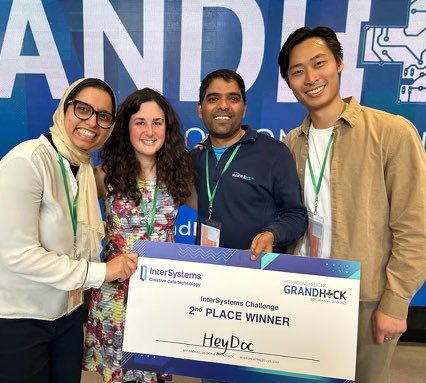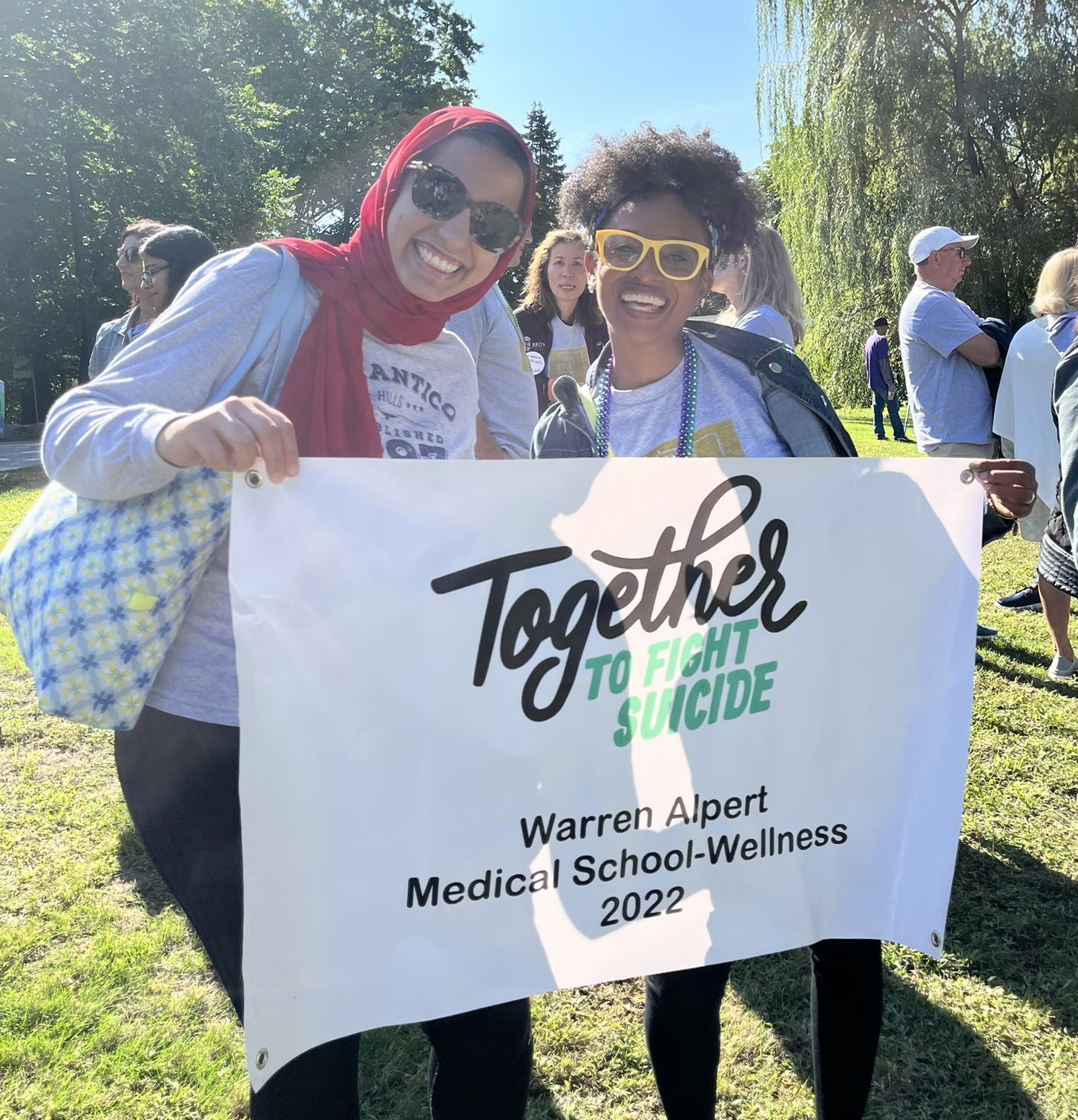Clinician Cameo: Alaa Elnajjar, Psychiatrist and Healthcare Hacker
The Clinician Cameo is a monthly interview series with a clinician in the Brown Department of Psychiatry & Human Behavior.
_0.jpg)
Alaa Elnajjar, M.D., is an attending child and adolescent psychiatrist at Bradley Hospital and the founder of Buddies Space, a digital platform for peer mentorship among physicians. She is also a clinical assistant professor in the Brown Department of Psychiatry and Human Behavior (DPHB).
Elnajjar talks with DPHB about healthcare hackathons, solutions to physician burnout, and the challenges of transplanting a career from Egypt to the United States.
How did you get involved in healthcare hackathons?
There’s a part of me that loves solving problems and creativity. In 2019, I saw an ad on LinkedIn about the MIT GrandHack. When I went to that first hackathon in New York, I felt so out of place as a physician talking to IT developers, designers, marketers, and business owners. For a second, I thought, “Oh my God, I'm so isolated from other stakeholders in the healthcare system.”
How do these hackathons work?
Everyone comes in with different backgrounds and expertise to focus on solving a specific systems problem in healthcare. You look at the impact on the patient, the healthcare system, the country, different countries.
That was a big paradigm shift for me. In the academic realm, there’s no discussion about how a problem drains a system of money and other resources. There’s a big gap between what we physicians are working on and what stakeholders are looking at. If we doctors leave that gap, it's going to get much bigger.
There’s a big gap between what we physicians are working on and what stakeholders are looking at. If we doctors leave that gap, it's going to get much bigger.
Your team won several prizes in the most recent GrandHack. Tell us about that.
On my team, there was a product manager, an occupational physical therapist, a software developer. We worked on a specific problem that came from a personal story: One of my team members had an Asian background and his grandma didn't understand some of the paperwork when she was discharged recently from the ER. We talked about the gap between what a patient understands in the discharge paperwork and what we, the doctors, understand.
We came up with a digital solution that uses AI [artificial intelligence] to help patients understand what's in the discharge summary and provide education around what they want to know. If they don’t have smartphones, they can just call a number and say, “I got discharged from the ER and I have this paperwork. Can you tell me more about this and this?” The technology has the potential to help patients in their own language.

You recently launched the website Buddies Space to address physician burnout. Did that project grow out of your hackathon experiences?
Yes. During the pandemic, I attended a hackathon to solve urgent problems related to COVID and the healthcare system. We talked about how physicians are burned out and need help with isolation and loneliness. During my fellowship, I was holding peer support groups for ICU residents and that's what the idea was built around: Could we build a buddy system for physicians to give them more social support?
The seed of Buddies Space is mostly connecting physicians to physicians, but the long-term plan is to build a community where physicians can open up about their mental health and get services tailored to their needs, like stigma-related problems or depression, from a psychiatrist or therapist really quickly.
I think in medicine there’s a huge culture of not showing vulnerability or weakness. If I could take one thing further in my medical life, it would be to help physicians be kinder to themselves around failure. Failure is part of every person’s career, and physicians are human beings.
You’ve written about your own challenges as a physician migrating from Egypt to the United States. How did you navigate those?
Being an international medical graduate and an immigrant is a big piece of my personality as a doctor. I came to the U.S. with a dream of having a better education and a better life for my kids. But it was a big move, because I’d finished my residency training in Egypt and already had an established career there as a clinical instructor.
In the U.S., you can’t practice medicine if you don’t do your residency here. So I initially thought I’d just do research. But I love my job and quickly made the decision to take the test and redo the training, which was good, because some of my colleagues waited and found it difficult to go back to being a trainee.
You learn so much from being a trainee and an immigrant. You need to figure out how to maintain your visa; how to secure a place that can continue to sponsor your visa; how you will see your family when you get your green card. I wrote a commentary article about these challenges with psychiatrists with the same background. I wanted to give possible solutions to make the transition easier for other people going through it.
How has your immigrant experience informed your work as a psychiatrist?
I think your empathy to patients from marginalized and minority groups is much more present, because you understand how the system can be difficult even for you – a physician – to understand, and you are at the top of the privileged minority group.
I think it's inspired me to not just be a better psychiatrist, but also to make use of that position. Recently, Brown held a refugee asylum clinic started and led by medical students, and I told them I'd volunteer to work with the Arabic-speaking patients.

You’ve also volunteered to create a peer support group for medical residents, right?
Right. As an international medical graduate, I had to hustle to figure out moving to a new place with a limited support system and having kids at the same time. Transitions can be hard, not just for international medical graduates, but also for American graduates. Transitions are also a point where you can improve the chances of connecting to mental health services and prevent burnout.
I connected with Kelly Holder, head of [the Warren Alpert Medical School] wellness center, and with [Gerardo] Carino of the GME [graduate medical education] office. We wrote a proposal for a peer support program for medical students transitioning to residency. We even submitted it to the ACGME, the organization responsible for accreditation in the graduate medical education system. It got accepted as a pilot project that offers GMEs.
In the program, we hold remote, drop-in weekly support groups where we connect medical students with resources and check in about moving to a new apartment, getting connected with health insurance, connecting them if they need a buddy. After the first session, the feedback was “We really needed that.”
You seem to thrive on creative problem-solving. Do you get to flex your creativity in other parts of your life?
Cooking! My husband’s more into following the recipe. But I’m like, “How about we try new things in that recipe?” [laughing]
With my kids, we don't play by the book. We always figure out a new way of playing a game. If we start reading a book, we act it out, then make up our own ending, then go back to the book to continue reading.
I like to write my own story, and that’s what I want for my kids, too.